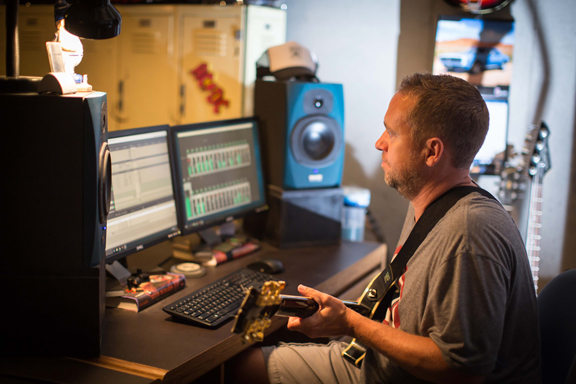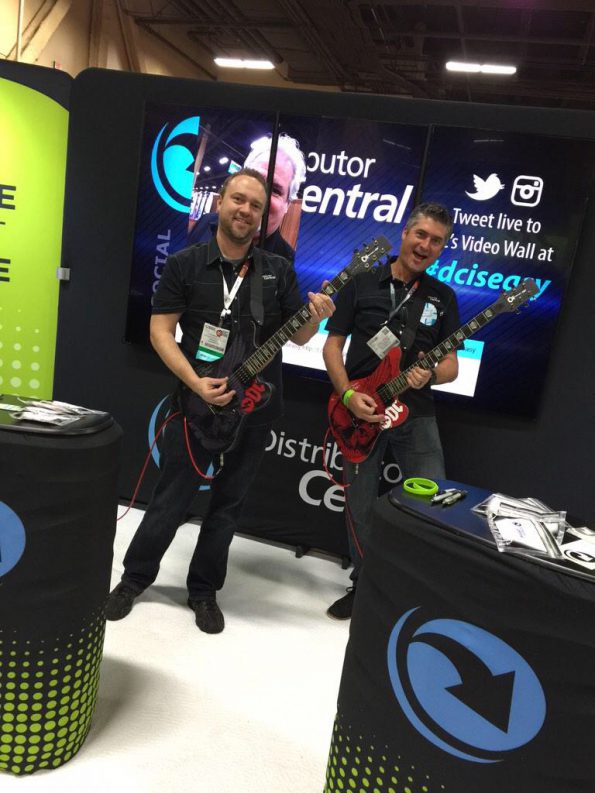Music Man
DistributorCentral’s Jason Nokes creates dynamic background tracks for TV shows—some of which you’ve probably heard.

Nokes records guitar tracks in his basement studio, next to the sump pump and AC unit.
The next time you’re watching your favorite TV show on the Discovery Channel, the History Channel, the Weather Channel or ESPN, listen carefully to the music accompanying the dramatic moments in the show, or the music behind the dialogue as a show goes to commercial. Somebody has to create that music. And that somebody just might be Jason Nokes, the guy you may know as president of Gardner, Kansas-based business services company DistributorCentral (UPIC: DC).
“I’ve made music for most of my life,” Nokes says. “Growing up, I was forced to take piano lessons and I hated it. But when MTV came out in the early ’80s, it made a lasting impression. I thought guitar was really cool. So I taught myself how to play guitar and played in bands. But I always liked the writing music portion of that the best, rather than the performing.”
Even when he was taking piano lessons, it was the creativity of writing music that spoke to him. “I played my own music at piano recitals when I was seven or eight,” he says, adding with a laugh, “I don’t think they were masterpieces.” But the experience fueled his desire to make his own music.
Nokes had a four-track recorder growing up so he could record his own overdub and be his own band. “And that’s what I do now. All the music in TV shows, it’s all me. I play all the instruments, except the drums, which are all loops that I piece together,” he says. “So it helped having a piano and guitar background.”
Nokes’ setup isn’t glamorous—it’s in his basement next to the sump pump and the air conditioning unit—but it’s functional, and doesn’t necessarily look like a music studio. If you didn’t know better, you’d just think he had a regular basement home office.
“Everything is software-based these days. Besides bigger speakers and a keyboard, my computer looks like every other computer. The keyboard doesn’t make any sounds itself. The synthesizer is actually software you download, so that’s how you can get any instrument in the world,” Nokes explains. “It’s made things accessible to everyone. Now I can compete. Maybe not full-blown albums, but anything that goes in TV shows, I can match that quality.”
With his full-time job at DistributorCentral and his role as a business owner (he and his wife, Aleksandra, own two Fantastic Sams hair salons in their community) he doesn’t have too much extra time on his hands. Throw in the couple’s two active boys, Loudon, 12, a drummer and competitive baseball player, and Rocklan, 10, who plays the cello, and his wife’s photography studio (aptly named LoudRock Studio after the kids), and it’s a miracle he has any time to create music.

Jason Nokes (left) and David Shultz, DistributorCentral VP and member of the triathlon band Iron Band, show off the guitars given to them as gifts by supplier Brand O’ Guitar Company (UPIC: guitar) at The PPAI Expo 2015.
“In the summer I don’t,” he says. “I only have time to work on music in the winter months.” Since he lives and works in the same community, he goes home for lunch. “I sit down for five minutes and try to come up with five ideas. Usually I find two good pieces. You don’t have to construct a full song—you just need a strong part and a not-so-strong part—and it only needs to be a couple of minutes long. You’re trying to set a mood and a tone, not be a focal point. If it’s too busy, it doesn’t work with dialogue,” he says.
One time he set a goal to create and finish a song in one hour. “And that thing has been played on TV!” he says. Hearing his songs on TV is a thrill, although he rarely catches them, in part because he has little time to watch TV. Usually he’ll find out a song of his has been used only when he gets his royalty statement. But once he caught his song in action on a Weather Channel show called Lifeguard. “They used my song as the music that plays when you go to commercial. I remembered the show being on my royalty statement and when I saw there were new episodes coming up, I recorded them. That was the first time I heard my song on TV,” Nokes says.
While writing music for TV isn’t necessarily going to support a family, movie trailers are a lot more lucrative. He’s been trying for a few years to break into that market. “Unfortunately, it’s highly competitive and movie trailer songs are done on spec [with no guarantee of being chosen or paid]. On the flip side, if your music gets chosen, the potential payment is substantial.” The good news is that the feedback he’s gotten on his movie trailer songs has been positive and helpful. Once summer is over, he’ll go back down in the basement, review those critiques and get to work.
Check out Nokes’ music on his website at www.carchasemusic.com or at https://soundcloud.com/jnokes.
Behind The Scenes of TV Music
Composers: The creators of the music.
Publishers: The organizations (such as ScoreKeepers Music) that collect, tag by theme, market and store composers’ music. “There’s a contract between the publishers and the composers. The publishers have a certain number of songs of mine and we’ve already negotiated our rates and payment. And then the publishers negotiate between themselves and the TV shows. So any time the TV show finds a song, they don’t have to negotiate with all those people. If you look at reality shows, there is music going on all the time. They could go through 100 songs in an episode,” Nokes explains.
Music Supervisors: The people in charge of music for a TV show. Nokes says, “They’ll have in mind what type of music they want to use in these different scenes. They’ll have a relationship with the publisher and typically they’ll have full access to all the songs the publishers have in their library.”
Performing Rights Organizations: Music supervisors turn in a cue sheet, which lists all the songs they used, how much of the song they used and how often, to a performing rights organization. The two biggest ones are Broadcast Music, Inc. (BMI) and the American Society of Composers, Authors and Publishers (ASCAP). The performing rights organizations divvy out the money to the publishers and the artists. Says Nokes, “I’ll get music on TV but I won’t know about it until months later. It just shows up on my royalty statement.”
Royalty Statement: The document that details what shows in countries all around the globe have paid to use a composer’s songs. Amounts can range from as little as one cent to hundreds or thousands of dollars.
Julie Richie is associate editor for PPB.

